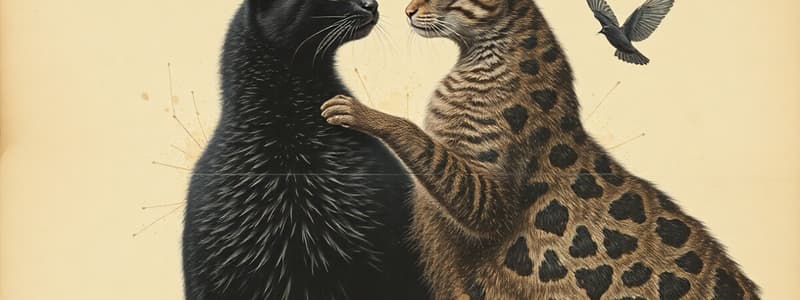Podcast
Questions and Answers
Which factor strongly influences visual appearance and life history traits of prey?
Which factor strongly influences visual appearance and life history traits of prey?
- Habitat variation
- Parental care
- Predation (correct)
- Nutrient availability
What mechanism allows for changes in behavior over time besides evolution?
What mechanism allows for changes in behavior over time besides evolution?
- Natural selection
- Learning (correct)
- Genetic mutation
- Migration
In high predation environments, what tends to happen to offspring size in guppies?
In high predation environments, what tends to happen to offspring size in guppies?
- Remains constant irrespective of predation
- Decreases due to survival adaptations (correct)
- Increases due to resource abundance
- Varies randomly with no correlation
What behavioral change is likely to occur when alarmed in a low predation environment?
What behavioral change is likely to occur when alarmed in a low predation environment?
What are the four key behaviors shared by animals referenced in the context of life history?
What are the four key behaviors shared by animals referenced in the context of life history?
What does social learning allow that individual learning does not?
What does social learning allow that individual learning does not?
What describes the process where offspring of certain species evolve to have larger beaks during drought conditions?
What describes the process where offspring of certain species evolve to have larger beaks during drought conditions?
What aspect of learning allows animals like rats to acquire food preferences?
What aspect of learning allows animals like rats to acquire food preferences?
Which method ensures that both experimenters and subjects are unaware of the treatment assignments in a study?
Which method ensures that both experimenters and subjects are unaware of the treatment assignments in a study?
How does a balanced diet impact the growth rate of organisms?
How does a balanced diet impact the growth rate of organisms?
What term describes the expectation of improvement in a placebo-controlled trial?
What term describes the expectation of improvement in a placebo-controlled trial?
What is the main focus of analyzing behaviors across generations?
What is the main focus of analyzing behaviors across generations?
What does the acronym PQ4R stand for in the context of learning strategies?
What does the acronym PQ4R stand for in the context of learning strategies?
What is the primary reason that homosexual behavior does not relate to fitness in many species?
What is the primary reason that homosexual behavior does not relate to fitness in many species?
In Laysan albatrosses, what is significant about female-female pairs?
In Laysan albatrosses, what is significant about female-female pairs?
What genetic factor is suggested to influence the likelihood of homosexuality in males?
What genetic factor is suggested to influence the likelihood of homosexuality in males?
What is the main role of oxytocin in social bonding among bonobos?
What is the main role of oxytocin in social bonding among bonobos?
Which feature distinguishes honey bee foragers from nurse bees?
Which feature distinguishes honey bee foragers from nurse bees?
What is the implication of having a high heritability in a trait concerning natural selection?
What is the implication of having a high heritability in a trait concerning natural selection?
What type of behavior does phototaxis measure in fruit flies?
What type of behavior does phototaxis measure in fruit flies?
What does the concept of inclusive fitness suggest about animal behavior?
What does the concept of inclusive fitness suggest about animal behavior?
What is suggested about anxiety in the context of evolutionary adaptation?
What is suggested about anxiety in the context of evolutionary adaptation?
What did research on guppies reveal about anti-predator behavior?
What did research on guppies reveal about anti-predator behavior?
What role do environmental factors play in the development of phenotypes?
What role do environmental factors play in the development of phenotypes?
How does the behavior of male fruit flies illustrate selection dynamics?
How does the behavior of male fruit flies illustrate selection dynamics?
How is behavioral plasticity demonstrated in taxi drivers?
How is behavioral plasticity demonstrated in taxi drivers?
What is a feature of artificial selection?
What is a feature of artificial selection?
What does the term 'Quantitative Trait Loci' refer to?
What does the term 'Quantitative Trait Loci' refer to?
Flashcards
Evolution
Evolution
A gradual change in the characteristics of a population over generations due to genetic variation and natural selection.
Learning
Learning
The acquisition of new information or skills through experience, allowing individuals to adapt to their environment.
Life History Traits
Life History Traits
Characteristics of an organism's lifespan, including growth, reproduction, and lifespan.
Four F’s
Four F’s
Signup and view all the flashcards
Fitness (in Biological Terms)
Fitness (in Biological Terms)
Signup and view all the flashcards
Critical Thinking
Critical Thinking
Signup and view all the flashcards
Scientific Method
Scientific Method
Signup and view all the flashcards
Blind Experiment
Blind Experiment
Signup and view all the flashcards
Double-Blind Experiment
Double-Blind Experiment
Signup and view all the flashcards
Placebo
Placebo
Signup and view all the flashcards
PQ4R Method
PQ4R Method
Signup and view all the flashcards
Individual Learning
Individual Learning
Signup and view all the flashcards
Social Learning
Social Learning
Signup and view all the flashcards
Antibiotic Resistance
Antibiotic Resistance
Signup and view all the flashcards
Heritable Variation
Heritable Variation
Signup and view all the flashcards
Homosexual Behaviour in Animals
Homosexual Behaviour in Animals
Signup and view all the flashcards
Extended Female Sexuality
Extended Female Sexuality
Signup and view all the flashcards
Male-Male Conflict
Male-Male Conflict
Signup and view all the flashcards
Social Tolerance in Bonobos vs Chimps
Social Tolerance in Bonobos vs Chimps
Signup and view all the flashcards
Fraternal Birth Order Effect
Fraternal Birth Order Effect
Signup and view all the flashcards
Maternal Immune Response
Maternal Immune Response
Signup and view all the flashcards
Hawk-Dove Game
Hawk-Dove Game
Signup and view all the flashcards
Inclusive Fitness
Inclusive Fitness
Signup and view all the flashcards
Phylogeny
Phylogeny
Signup and view all the flashcards
Insect Agriculture
Insect Agriculture
Signup and view all the flashcards
Nurse-Forager Transition in Honey Bees
Nurse-Forager Transition in Honey Bees
Signup and view all the flashcards
Genetic Basis of Behaviour in Honey Bees
Genetic Basis of Behaviour in Honey Bees
Signup and view all the flashcards
Quantitative Trait Loci (QTL)
Quantitative Trait Loci (QTL)
Signup and view all the flashcards
Heritability (Broad Sense)
Heritability (Broad Sense)
Signup and view all the flashcards
Heritability (Narrow Sense)
Heritability (Narrow Sense)
Signup and view all the flashcards
Response to Selection (R)
Response to Selection (R)
Signup and view all the flashcards
Selection Differential (S)
Selection Differential (S)
Signup and view all the flashcards
Study Notes
Animal Behaviour & Evolution Summary
- Homosexual behavior does not result in offspring, so it is not related to fitness. It is found in many species. Courtship behavior is observed in same-sex relationships, but sexual orientation is specific to humans.
- Sexual behavior without reproduction is common in females, and extended heterosexual behavior is also common.
- Chimpanzees are only fertile for 3-4 days, but extended homosexual behavior is common.
Laysan Albatross
- No visible physical differences between the sexes.
- 31% of female-female pairs.
- Both mothers raise one chick per year in homosexual behavior pairs.
- Hatching rate lower in homosexual pairs.
Humans
- Same-sex attraction varies (1% exclusive, 8-10% some contact, 2%-11% encounters within 5 years).
- Same-sex attraction is not considered an evolutionary dilemma if it does not impact reproductive fitness.
Variation
- Behavioral phenotypes exhibit significant variation.
- Heritability is higher in males (0.2-0.5) than in females.
Environment
- Less heritable in women (0.2-0.5).
- Older brothers increase the likelihood of homosexuality in later-born males in humans.
Same-Sex Bonobos
-
Bonobos exhibit same-sex behavior, initiating and maintaining social relationships and decreasing tension.
-
Increased oxytocin levels are linked to social bonding.
Social Tolerance
- Bonobos show more social tolerance than chimpanzees in conflict situations, such as co-feeding, sexual behavior, play, and aggression.
Maternal Immune Response
- Maternal antibodies to male-specific proteins may alter sexual orientation.
- Mothers with higher levels of neuroligin 4Y protein.
- Links to social behavior and altered brain function in male fetuses.
Fighting
- Aggression involves threatening signals or physical combat.
- Dominance hierarchies are established through aggressive interactions.
Hawk-Dove Game
- Hawk strategy: escalate conflict until injured.
- Dove strategy: display, retreat if escalated.
- Resource value (V) is greater than cost (C) favors the Hawk strategy.
- Mixed strategy occurs when V is less than C.
Fruit Flies
- Males court both males and females, often suppressing rivals.
- Male-male conflict is common.
- Females engage in same sex behavior.
Fish
- (Green Swordtail) fish display aggression less often towards winners in one-way mirrors instead of those in a two-way mirrors. Fish will fight less when in contact with a mirror.
Sexual Selection
- Individuals of one sex choose mates from the other sex.
- Individuals of the same sex compete for mates.
- Females show mate preference based on certain traits (e.g., coloration, ornaments) or behaviors of males.
Mating Behaviors in Different Species
- Males and females can differ in size and appearance.
- Species exhibit varied mating strategies.
Birds
- Birds sing (e.g., courtship) to attract mates, identify territory, or communicate among themselves.
Foraging
- Animals use diverse strategies to obtain food (e.g., foraging optimization models).
Predator Avoidance
- Animals have evolved varied predator avoidance strategies.
- In some case predators were artificial or chemical.
- Predator avoidance behaviors can influence morphology, behavior, and life history characteristics.
Studying That Suits You
Use AI to generate personalized quizzes and flashcards to suit your learning preferences.




